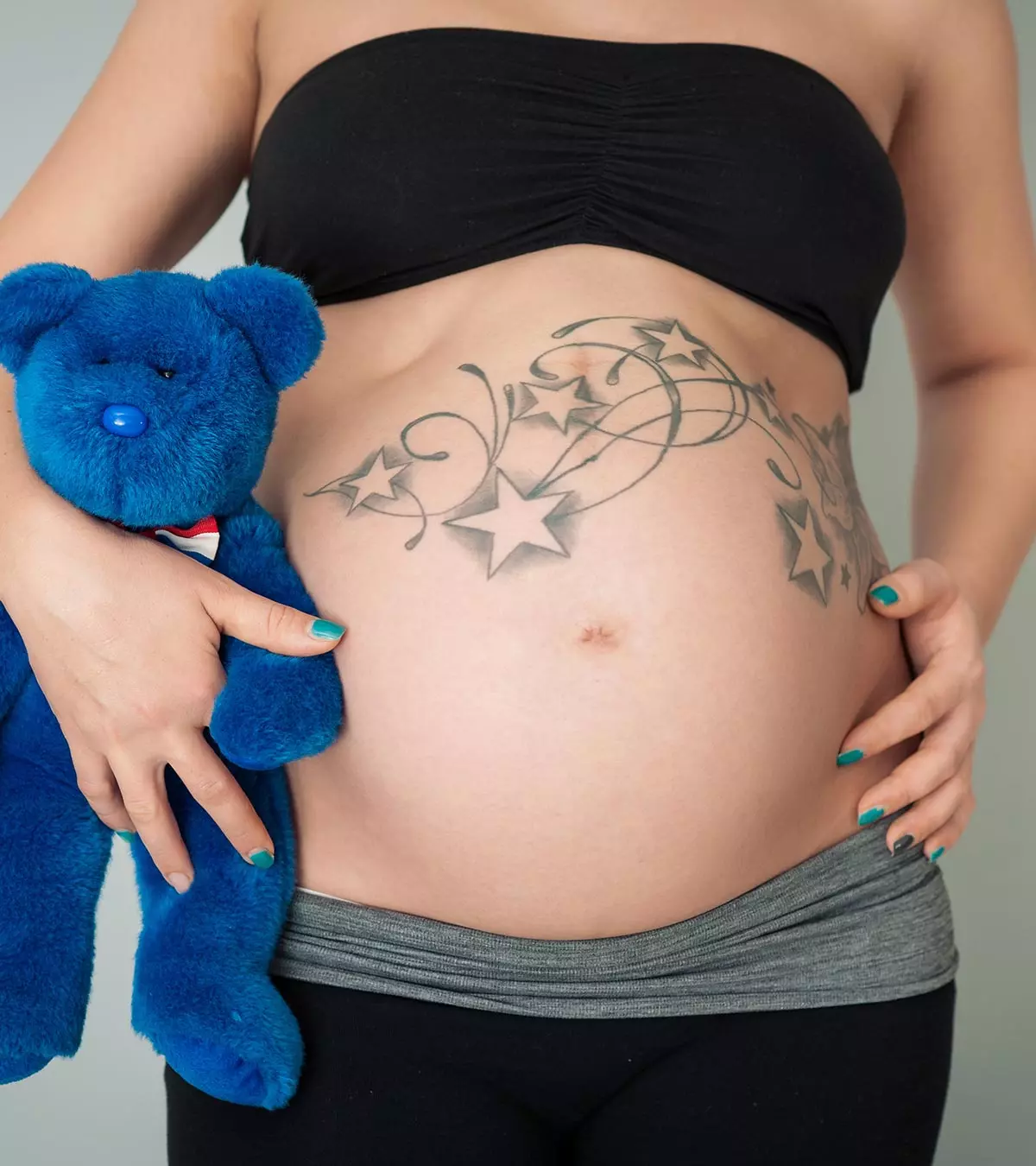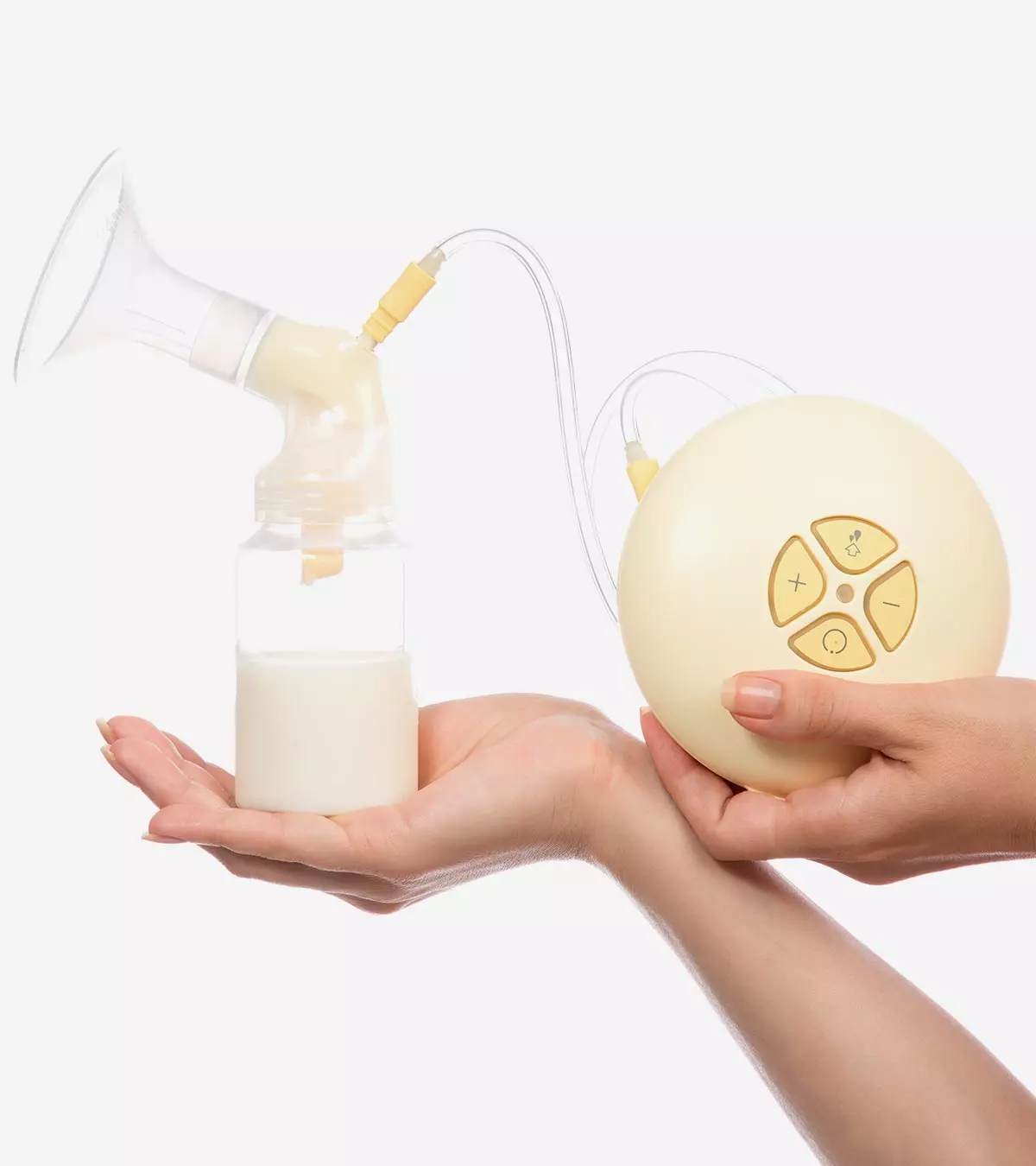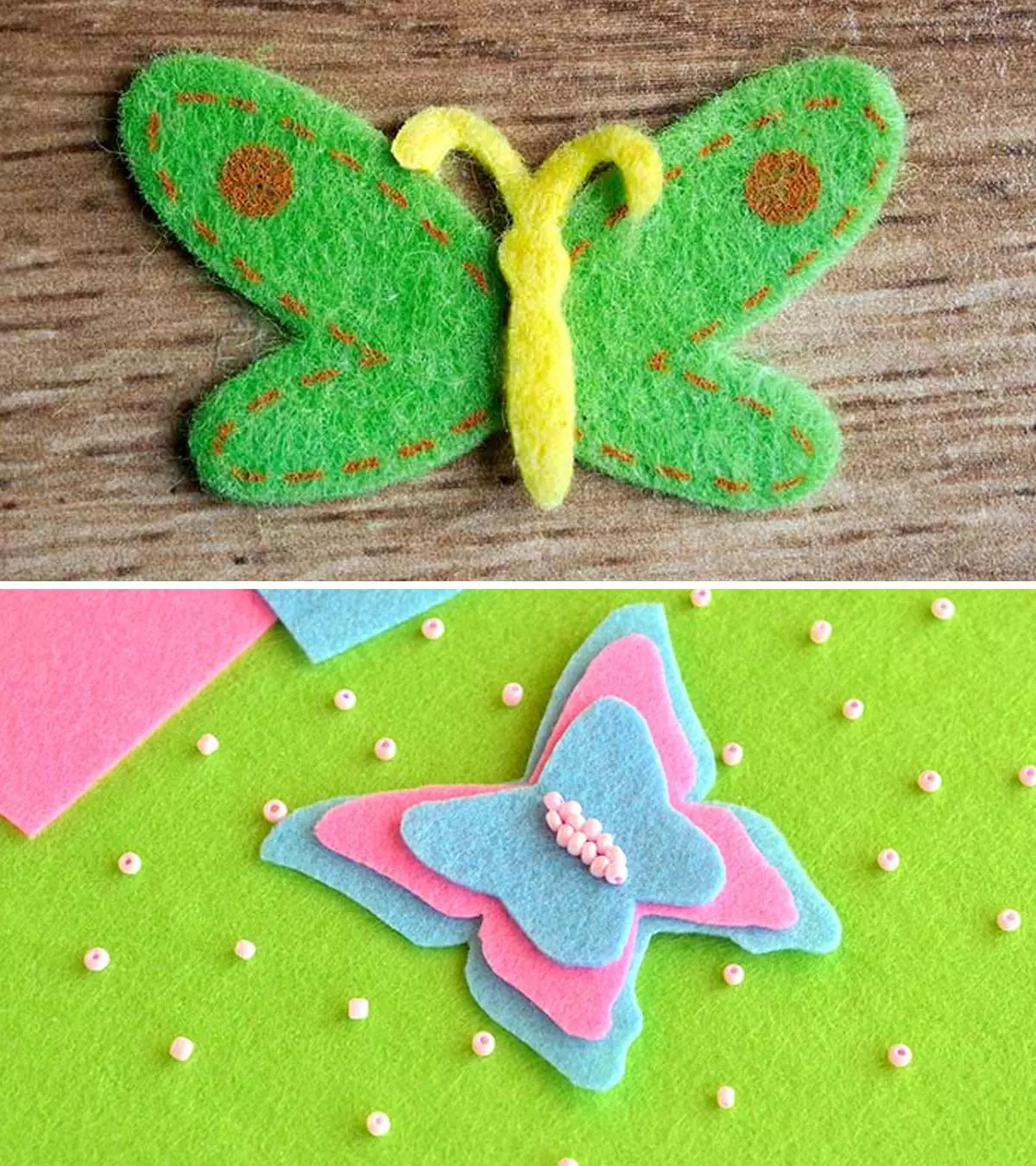

Image: Shutterstock
Teeth grinding in babies and toddlers is a common occurrence. Also known as bruxism, you may often find your toddler grinding their teeth in the middle of the night. While clenching or grinding teeth is a common form of expression in adults to show anger or anxiety, this action may alarm you if it is coming from your baby.

Some babies and toddlers may grind their teeth when awake; however, it is mostly seen when sleeping. Whether conscious or unconscious teeth grinding, it occurs in toddlers for various underlying reasons.
Read on to know the causes of bruxism and simple techniques to help prevent it.
What Is Bruxism?
Bruxism is the medical term for a condition where an individual grinds his or her teeth or clenches the jaw very tightly. It occurs in adults but is also prevalent in babies and toddlers. About 20-30% of babies and toddlers suffer from bruxism. Sleep bruxism is not normal and is considered a sleep-related disorder that may require medical attention but not necessarily medication.
What Are The Symptoms Of Bruxism?
Often parents learn about their baby’s bruxism when he shows symptoms such as deteriorated teeth health, jaw pains, or headaches. In addition to these, there are other symptoms:
- Teeth make grinding noises: This is the first sign. Your little one makes audible sounds of grating or grinding teeth when asleep or awake. However, he is oblivious to the activity and does it subconsciously.
- Sore gums or jaws: The toddler may regularly complain of aching gums or jaws in the morning. The constant grinding of the teeth creates pressure on the muscles responsible for mastication, which makes them sore by morning. If the baby is young, then he may frantically rub hands around the jaw or face due to the pain.
- Chronic headache: The temporal muscle, used in mastication, is attached to the sides of the skull at the temples. A sore temporal muscle can radiate pain all across the head causing a headache. If your toddler suffers from severe bruxism, he may complain about a constant headache, especially acute pain around the temples.
- Chipped or grated teeth: The teeth would appear grated, flattened, or chipped, especially along the edges. Teeth most affected by bruxism get flattened with some displaying a deep sunken crest.
- Abnormal tooth loss: Due to the constant pressure, toddlers with bruxism have loose teeth that shed much before the permanent teeth grow out.
- Bruises on tongue or inner cheek: You can observe redness on the walls of the inner cheek and bruises on the tongue. It occurs when the flesh of the inner cheek or tongue accidentally comes between the clenched teeth.
- Snoring and mouth breathing: This is observed in babies/toddlers who suffer from bruxism due to obstructive respiratory disorders such as sleep apnea or adenotonsillar hypertrophy.
The symptoms are discernible if the parents stay vigilant. But why does bruxism occur in babies and toddlers?
What Are The Reasons For Bruxism?
The causes for bruxism are unclear. Although commonly believed, teeth grinding is not related to worm infestation. The probable reasons why a baby or toddler would grind his teeth are:
- Teething pain: Infants can clench their jaws as a response to the pain caused by teething. Grinding their teeth helps subdue the pain.
- Ear infection: Pain caused by ear infection can radiate all the way to the lower jaw, making the baby grind his teeth as a response. Do note that ear infection is not a direct cause of bruxism.
- Sleep apnea: Babies suffering from obstructive sleep apnea may grind their teeth as an incidental effect of the condition (1). Sleep apnea causes the jaw muscles to open the mouth involuntarily, which leads to grating and grinding of the teeth due to the constant tension on the jaw muscles.
- Infection of tonsils: Infection of the tonsils, especially adenoid tonsils, leads to hypertrophy or abnormal enlargement of the tissue. The pain and airway obstruction cause teeth-grinding. Babies and toddlers that suffer from bruxism due to adenotonsillar hypertrophy could have at least 75% of their airways obstructed due to the swollen tissue.
- Attention deficit hyperactivity disorder (ADHD): There is a clinically proven correlation between bruxism and the occurrence of ADHD in a toddler (2). In these cases, grinding of teeth can occur at any time of the day. Those receiving medication for ADHD have a higher occurrence of bruxism.
Little is known about the exact link between ADHD and bruxism, although some studies suggest that bruxism in ADHD toddlers is due to external stress such as family problems, mental disorders in parents or fragile psychological stress factors. One study found a higher incidence of maternal depression among ADHD toddlers with bruxism than those who had ADHD without bruxism (3).
Psychological disorders are often linked with bruxism with a study indicating that a toddler with a mental disorder is 3.6 times more likely to develop bruxism (4).
- Stress: While stress is outright dangerous for toddlers who have ADHD, it can influence even the healthy ones to develop bruxism. In toddlers, this stress can be due to simple conditions such as joining a new playschool or living with a disliked relative. Toddlers also have a tendency to throw tantrums that may take a form of anger and irritation, leading to subconscious teeth grinding.
- Neurological disorder: Neurological disorders may increase the prospects of a toddler developing bruxism. For example, acute bruxism is observed in toddlers with cerebral palsy in combination with a host of other oral problems (5). Poor motor control and neural degeneration are often the reasons for teeth grinding. Therefore, the severity of bruxism is likely to be proportional to the seriousness of the neurological disorder.
- Sleep disorders: Bruxism has a particular association with sleep disorders (6). An example is the greater incidence of bruxism among toddlers who sleep talk. Like several sleep-related problems, sleep bruxism occurs during REM sleep, therefore, making it a sleep disorder.
After you observe the symptoms and understand the causes for teeth-grinding in your little one, you need to take steps to address the problem.
How To Manage And Treat Bruxism?
Unless very severe, bruxism does not require any treatment, and most babies and toddlers will outgrow the condition. There is no specific treatment for bruxism, and most doctors aim at stopping the baby or toddler from grinding teeth by treating the underlying medical condition. Curing the cause invariably treats bruxism. However, there are some simple ways to manage bruxism in combination with the treatment of the fundamental problem:
- Stress management: Stress is among the first things a doctor probes to discern the cause of bruxism. As a parent, you can chat with your toddler to understand if she is disturbed due to something in her life. Managing stress becomes more important for babies and toddlers who suffer from neurological disorders due to their limited capability to tackle stressful situations. They need counseling and parental support.
- Physiotherapy: Toddlers can be trained to have greater control of their jaw muscles by using behavioral physiotherapy. It helps them learn the correct way of using the jaw muscles. It works especially well for toddlers who grind their teeth even during their waking hours and may have trouble eating.
- Dental mouthguards: A toddler can sleep with a dental mouthguard if the damage to his teeth is extreme. The mouthguard looks like braces and forms a barrier between the lower and upper jaws. It prevents grinding of teeth leading to better oral health.
- Dental correction: A doctor may prescribe dental correction if the condition is on account of teeth alignment. Toddlers still have milk teeth but can suffer from misalignment, which can cause abnormal contact between the teeth of the upper and lower jaw.
- Muscle relaxants: Muscle relaxants are prescribed by the doctor as oral medicines, which the toddler can have before bedtime or whenever he is prone to grinding his teeth. Muscle relaxant drugs are used as a last resort when the patient’s response to treatment is extremely slow or when the condition is severe.
Bruxism in itself is not an emergency, but there are certain scenarios in which you need to act swiftly.
When To Rush To The Doctor?
Here are some situations where you must show haste in consulting the doctor:
- Bleeding from gums or mouth: If your baby/toddler has excessive bleeding from her gums or any part of the mouth, then it could indicate severe bruxism.
- Bruxism is accompanied by fits or seizures: This can happen due to acute neurological disorders or neural degeneration due to a disease.
- Baby/toddler is unable to eat: Inability to eat properly may lead to stunted growth, which can have long-term negative repercussions.
- Pain is causing constant colic: During teething, excessive teeth grinding can leave the gums terribly sore leading to intense pain and tension in facial muscles, which is common in infants.
Prompt treatment is essential to prevent bruxism from causing any lasting damage to the health of the baby.
Long Term Effects Of Bruxism
If left undiagnosed and untreated, bruxism can cause some serious problems like the following:
- Temporomandibular joint disorder: The temporomandibular joint connects the mandible or jawbone to the skull, acting as a hinge for the jaw to open and close. Bruxism can cause excessive pressure on the joint, which makes general actions such as chewing quite painful. It can also cause a clicking sound every time the baby or toddler chews. This acute pain and discomfort while moving the jaw is referred to as temporomandibular joint disorder.
- Facial myalgia: It is the constant sensation of facial pain during normal activities such as speaking or smiling. Teeth-grinding creates immense pressure on facial nerves that may eventually malfunction by transmitting consecutive pain impulses to the brain.
- Headache: Those suffering from bruxism are thrice more likely to suffer from headaches. Your child could suffer at the baby and toddler stages and beyond, leading to a chronic headache.
- Abnormal tooth breakage: If bruxism becomes a constant problem, then it may damage permanent teeth that cannot be replaced. It can impact the general well-being of the little one.
Therefore, it always helps to prevent than wait for bruxism to strike with full force.
How Do I Prevent Bruxism In Babies And Toddlers?
There are no concrete steps to avert the problem, but there are some simple things you can do to mitigate the chances of your baby developing bruxism:
- Have a relaxing routine for the baby/toddler: Alleviating stress is the best way to reduce the chances of your little one developing bruxism. You can have a relaxing routine for the baby/toddler, especially before bedtime, by giving him a warm bath or reading out a soothing story. Interact with your baby regularly to understand his feelings and thoughts.
- Let your baby have adequate sleep: Lack of sleep can lead to fatigue, which adversely affects the health and growth of babies and toddlers. Sleep relaxes muscles that can reduce the chances of bruxism.
- Staying alert about a medical condition: Perhaps the best preventive measure is being watchful of any medical condition that your little one has. If you believe he is showing signs of a problem, or even bruxism, then bring it to the attention of a pediatrician.
Frequently Asked Questions
1. Do toddlers with autism grind their teeth?
Toddlers and children with autism may grind or clench their teeth during sleeping. Bruxism or forceful teeth grinding can cause tooth damage and make dental care more challenging. Children with various behavioral, neurological, and developmental issues can exhibit bruxism (7)
2. Is teeth grinding a sensory issue?
Grinding or clenching teeth can be linked to sensory issues. The brain gets strong sensory inputs while grinding and clenching teeth due to jaw vibrations, and these simulations may balance the nervous system. This can also cause issues such as biting others or objects (8).
3. Can sleeping position cause bruxism in a toddler?
Sleeping positions may influence bruxism since some people may experience sleep bruxism only in certain sleeping positions. It can be due to the jaw being set in specific positions reflexing natural eating. Changing sleep position may help manage bruxism in some toddlers (9)
Teeth grinding in babies may be an indication of an underlying discomfort. Your baby may be participating in it unconsciously. Although this is not a serious illness, the constant grinding of the teeth may affect dental hygiene. If your baby has bruxism, inform the pediatrician. They shall proceed with the treatment plan based on the cause. Since teeth grinding could also result from psychological issues, try to create a soothing bedtime routine for your baby. If you notice any discomforting signs, inform your pediatrician promptly.
References
- Causes Of Bruxism.
http://www.bruxism.org.uk/causes-of-bruxism.php - Ghadah A Malki et al.; (2004); Prevalence of bruxism in children receiving treatment for attention deficit hyperactivity disorder: a pilot study.
http://www.bruxismo.eu/pdf/Prevalence%20of%20bruxism%20in%20children%20receiving%20treatment%20for%20attention%20deficit%20hyperactivity%20disorder%20-%20a%20pilot%20study.pdf - Ahmad Ghanizadeh; ADHD bruxism and psychiatric disorders: does bruxism increase the chance of a comorbid psychiatric disorder in children with ADHD and their parents?
https://pubmed.ncbi.nlm.nih.gov/18421490/ - Andrew T Cheifetz et al.; (2005); Prevalence of bruxism and associated correlates in children as reported by parents.
https://pubmed.ncbi.nlm.nih.gov/16294935/ - Ana Paula et al.; (2016); Risk factors for dental caries in children with developmental disabilities.
https://www.scielo.br/j/bor/a/NNzBLyGHTwjWxpzrPFvMJZz/?lang=en - Sleep disorders in children with Attention-Deficit/Hyperactivity Disorder (ADHD) recorded overnight by video-polysomnography.
https://www.researchgate.net/publication/26293469_Sleep_disorders_in_children_with_Attention-DeficitHyperactivity_Disorder_ADHD_recorded_overnight_by_video-polysomnography - M S Muthu And K M Prathibha; (2008); Management of a child with autism and severe bruxism: a case report.
http://www.bruxism.org.uk/causes-of-bruxism.php - Possible Sensory Reasons For Some Behaviours And Suggestions/Strategies For Managing Or Changing Them.
https://czone.eastsussex.gov.uk/media/3714/possible-sensory-reasons-for-some-behaviours.pdf - Bruxism – Teeth Grinding Symptoms, Treatment & Causes.
https://sleepdoctor.com/bruxism/
Community Experiences
Join the conversation and become a part of our nurturing community! Share your stories, experiences, and insights to connect with fellow parents.
Read full bio of Dr. Vivek Goswami
Read full bio of Dr. Ritika Shah














